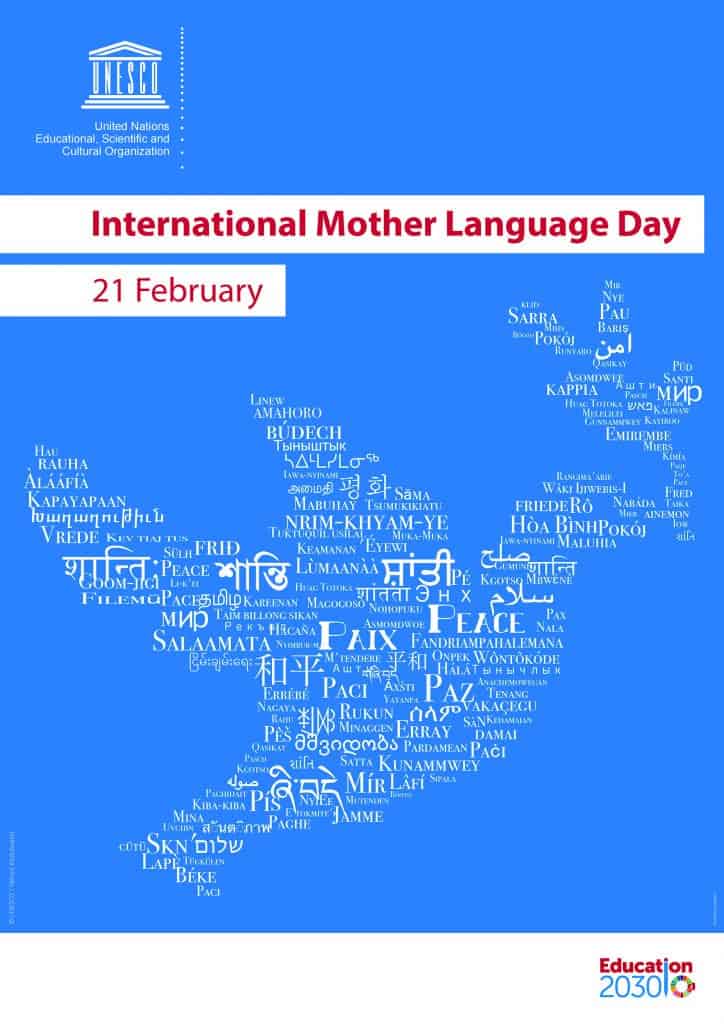
This year’s theme of international mother language day is indigenous languages as a factor in development, peace, and reconciliation, as 2019 is the International Year of Indigenous Languages
The idea to celebrate International Mother Language Day was the initiative of Bangladesh. It was approved at the 1999 UNESCO General Conference and has been observed throughout the world since 2000.
UNESCO believes in the importance of cultural and linguistic diversity for sustainable societies. It is within its mandate for peace that it works to preserve the differences in cultures and languages that foster tolerance and respect for others: “Linguistic diversity is increasingly threatened as more and more languages disappear. Globally 40% of the population does not have access to an education in a language they speak or understand. Nevertheless, progress is being made in mother tongue-based multilingual education with growing understanding of its importance, particularly in early schooling, and more commitment to its development in public life. Multilingual and multicultural societies exist through their languages which transmit and preserve traditional knowledge and cultures in a sustainable way.”
Director-General of UNESCO, Ms Audrey Azoulay released the following statement, stressing the importance of preserving indigenous languages:
“Our language is shedding tears all over because its own children are deserting it, leaving it alone with its heavy burden.” – from a Wolof poem by Useyno Gey Cosaan (Senegal)
“For UNESCO, every mother tongue deserves to be known, recognized and given greater prominence in all spheres of public life. This is not always the case. Mother tongues do not necessarily have national-language status, official-language status, or status as the language of instruction. This situation can lead to the devaluation of a mother tongue and to its ultimate disappearance in the long term.
“On this twentieth anniversary of International Mother Language Day, we must remember that all mother tongues count and that they are all essential to building peace and supporting sustainable development.
“A mother tongue is vital to literacy because it facilitates the acquisition of basic reading and writing skills, as well as basic numeracy, during the first years of schooling. These skills provide the foundation for personal development. A mother tongue is also a unique expression of creative diversity and identity, and is a source of knowledge and innovation.
“Much remains to be done. Learners’ mother tongues are rarely the language of instruction during the first years of schooling. According to UNESCO, nearly 40 per cent of the world’s population lack access to education in a language which they speak or understand. This situation persists despite studies showing that the command of a mother tongue facilitates general learning and learning of other languages.
“Indigenous peoples have always expressed their desire for education in their own languages, as set out in the United Nations Declaration on the Rights of Indigenous Peoples. Since 2019 is the International Year of Indigenous Languages, the theme of this year’s International Mother Language Day will be indigenous languages as a factor in development, peace and reconciliation.
“Indigenous peoples number some 370 million and their languages account for the majority of the approximately 7,000 living languages on Earth. Many indigenous peoples continue to suffer from marginalization, discrimination and extreme poverty, and are the victims of human-rights violations.
“In the light of Sustainable Development Goal 4 (https://sustainabledevelopment.un.org/sdg4) and of the objective to leave no one behind, it is essential that indigenous peoples have access to education in their own languages.
“On this International Mother Language Day, I thus invite all UNESCO Member States, our partners, and education stakeholders to recognize and enforce the rights of indigenous peoples.”





